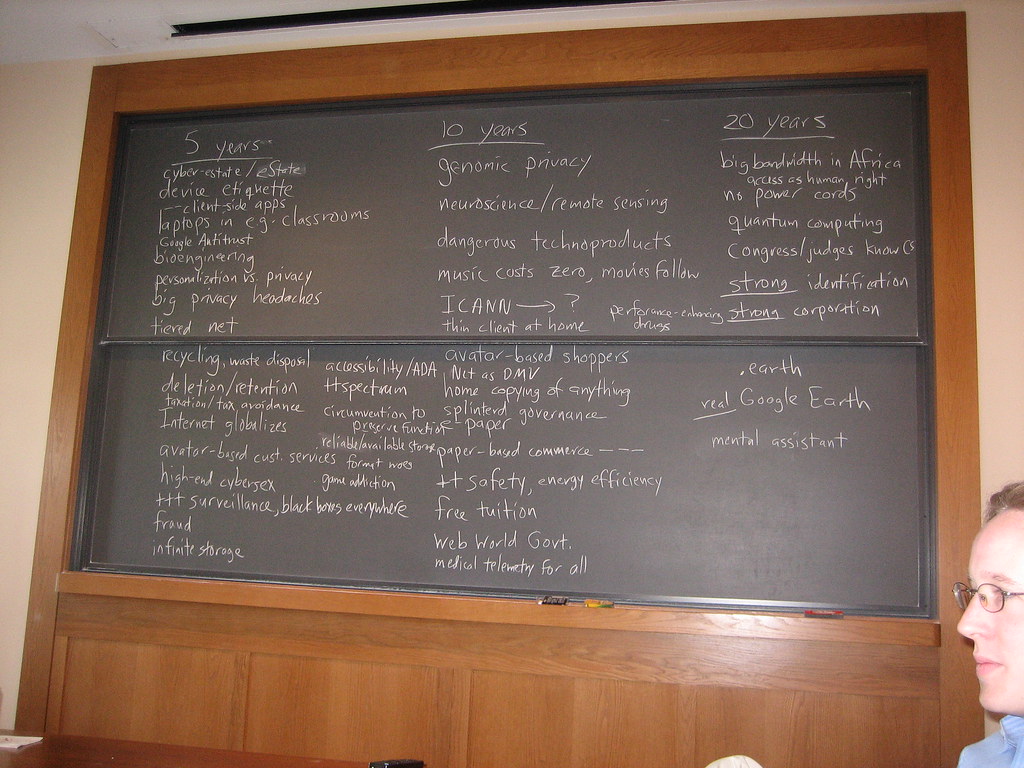For those who didn’t already know, I work in academia. I work in the Computer Science Dept. at Princeton University. Every week I attend the “IT Policy Lunch”, which is a gathering of anyone on campus who is concerned with IT Policy. It’s hosted by Ed Felten, who heads up research into IT Policy. You may already be familiar with some of results of Ed’s work.
So this week’s lunch discussion topic was “Futurism”. About 20-30 people from around the department and the campus got together and spitballed ideas for what we think will be major IT Policy debates, technology advances, etc., over the next 5, 10, or 20 years. It was a lot of fun, and I really enjoy observing how technology-oriented people think about or expect of the non-technology-oriented masses. Often I think we fall into the habit of assuming that the masses will somehow care about things like being injected with RFID tracking chips.
Anyway, below is a quick rundown of some of the ideas that were being tossed around. I couldn’t remember how to explain all of the things that were written on the board, so I’ve also included a picture of the board itself 😀 Enjoy
5 years:
- big content providers like Comcast and Verizon will be relegated to being solely a delivery mechanism, as most digital content will be delivered over the internet.
- cyber-estate issues: what happens to your data when you die, are licenses for media, data, software, etc inheritable?
- one person only half-jokingly predicted a Google antitrust suit within 5 years.
- a suggestion about how taxes might come into play with regards to the internet and internet purchases leads to another discussion about how the “tax the ‘net” model could be used as leverage, or to scare people into compromising toward a tiered internet model.
- As more digital devices come out, and more technology fits in the palm of our hands, not only is battery life (and, more generally, energy) an issue, but there’s also an implication that recycling is also going to be an issue.
- Speaking of recycling, data retention/deletion policies are predicted to spark more and hotter debates in the coming few years as more court cases rely upon subpoenas for digital communications or other digitally-stored data.
- Game addiction will become an important issue that requires attention.
- client side applications will continue to move to internet-based delivery, a la Flickr for photo management instead of iPhoto, or Google Docs for word processing instead of Word.
- digital surveillance, privacy, and all kinds of “Big Brother” type predictions were prevalent, painting a bit of a gloomy five year outlook. Sadly, this outlook did not seem to improve in the 10 and 20 year predictions.
- identity theft and other types of digital fraud will become more prevalent and bigger parts of IT Policy and legislative debates.
10 years:
- genomic privacy will begin to be an issue as DNA begins to be used for more day-to-day identification, especially in the healthcare field.
- we’ll begin to see more lawsuits along the lines of “my cell phone gave me cancer” as more and more technology penetrates a greater and greater percentage of the global population.
- the cost of music falls to zero, and movies follow shortly behind. Social implications are briefly discussed. It is mentioned, for example, that movie theaters will cease to exist – but movies, it is countered, are also a social activity. Whether this says something about how technology affects our social interactions isn’t really touched on, but there is mixed opinion about the end result.
- ICANN will not exist, and if it does, it will look nothing like what it looks like now.
- e-paper will finally become widely used. There are a couple of comments about how this might effect things like IRS tax forms, and banking/checking.
20 years:
- My own prediction was that there would be internet access for most of Africa in 20 years. I was saddened to think it would take this long when I said it. I was more saddened by the fact that the idea drew one of the most pessimistic reactions of the entire discussion. :-/ The idea of ‘access as human right’ is briefly discussed.
- My other prediction for 20 years out got a bit of a better reaction – I said that in 20 years, there will be a large number of people in Congress who have some clue about how technology works.
- Someone said we might need a “.earth” TLD to differentiate Earth-bound entities from those of other planets.
- Ok, so most of my predictions were for 20 years. I suggested that by then, nanotech will make it possible for us to power devices we might be carrying around then using our clothing or ‘solar satchels’ that collect power from the sun.
- human genomes will be the de facto standard in identification.
- quantum computing will be a practical reality.
- offloading things you currently memorize into some storage device, from your brain, will be a reality.
Technorati Tags: technology, futurism, predictions, itpolicy, legislation, legal, computerscience, healthcare, society, privacy, digital, media













